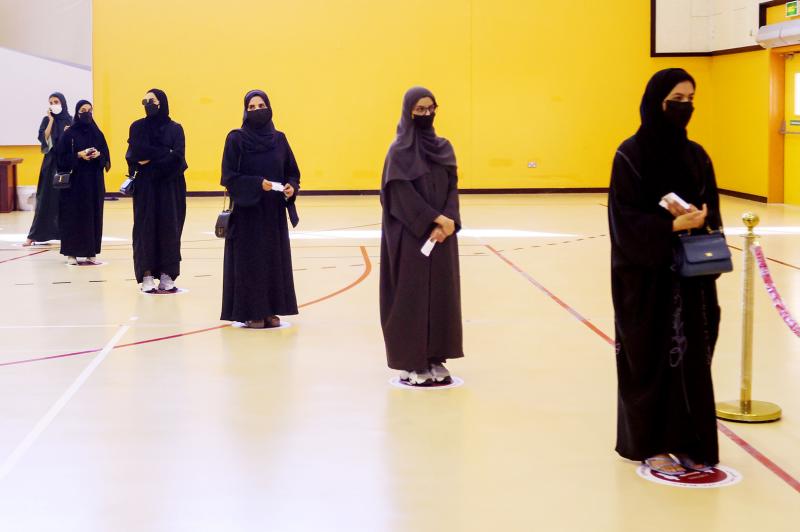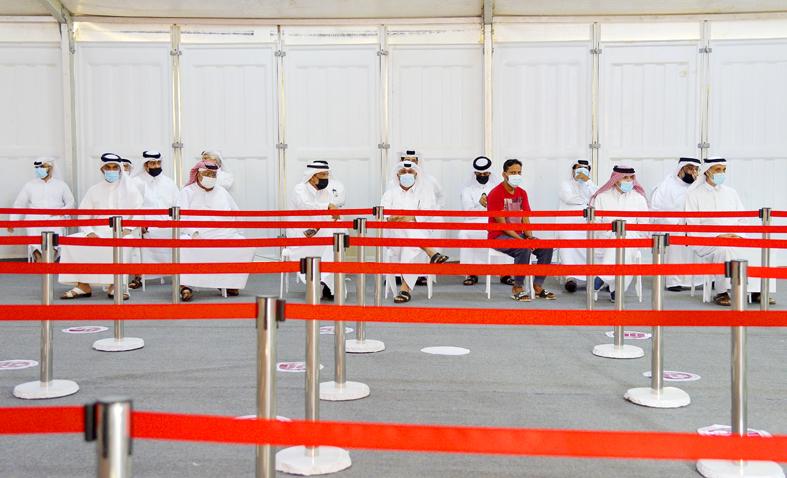Qataris yesterday began voting in the Gulf state’s first legislative elections for two-thirds of the advisory Shura Council in a vote that has stirred domestic debate about electoral inclusion and citizenship.
Voters began trickling into polling stations, where men and women entered separate sections, to elect 30 members of the 45-seat body. The ruling emir would continue to appoint the remaining 15 members.
“With the chance to vote, I feel this is a new chapter,” said Munira, a children’s book author who asked to be identified by only one name. “I’m really happy of the number of women standing as candidates.”

Photo: Reuters
The Council would have legislative authority, and approve general state policies and the budget, but would have no control over executive bodies setting defense, security, economic and investment policies for the small, but wealthy gas producer, which bans political parties.
Eighteen women are among the 183 candidates hoping to be elected at stations across 30 districts in the country, which has for several years held municipal polls.
Campaigning has taken place on social media, community meetings and roadside billboards.

Photo: EPA-EFE
“This is a first-time experience for me ... to be here and meet people talking about these things that we need,” said Khalid Almutawah, a candidate in the Markhiya District. “In the end we want to promote our society, and we try our best to help our people and our government.”
The election indicates that Qatar’s ruling Al Thani family is “taking seriously the idea of symbolically sharing power, but also effectively sharing power institutionally with other Qatari tribal groups,” Georgia State University’s Middle East Studies Center director Allen Fromherz said.
The election, approved in a 2003 constitutional referendum, comes ahead of Doha hosting the soccer World Cup next year.
However, critics have said that voting eligibility is too narrow.
Qatari Deputy Prime Minister Sheikh Mohammed bin Abdulrahman Al Thani last month described the vote as a new “experiment,” saying that the council cannot be expected from the first year to have the “full role of any parliament.”
Kuwait has been the only Gulf monarchy to give substantial powers to an elected parliament, although ultimate decisionmaking rests with the country’s emir, as in neighboring states.
The huge number of foreign workers in Qatar, the world’s top liquefied natural gas producer, means that nationals make up only 10 percent of the population of 2.8 million.
However, even then not all Qataris are eligible to vote.
The polls have stirred tribal sensitivities after some members of a main tribe found themselves ineligible to vote under a law restricting voting to Qataris whose family was present in the country before 1930.
Mohammed bin Abdulrahman Al Thani has said that there is a “clear process” for the electoral law to be reviewed by the next Shura Council.
Human Rights Watch has said that thousands of Qataris are excluded.
The organization said that Qatar arrested about 15 demonstrators at a protest led by Al Murra tribe members in August, as well as critics of the voting law.
A Qatari source with knowledge of the matter on Friday said that two critics remained in custody “for inciting violence and hate speech.”

PRECARIOUS RELATIONS: Commentators in Saudi Arabia accuse the UAE of growing too bold, backing forces at odds with Saudi interests in various conflicts A Saudi Arabian media campaign targeting the United Arab Emirates (UAE) has deepened the Gulf’s worst row in years, stoking fears of a damaging fall-out in the financial heart of the Middle East. Fiery accusations of rights abuses and betrayal have circulated for weeks in state-run and social media after a brief conflict in Yemen, where Saudi airstrikes quelled an offensive by UAE-backed separatists. The United Arab Emirates is “investing in chaos and supporting secessionists” from Libya to Yemen and the Horn of Africa, Saudi Arabia’s al-Ekhbariya TV charged in a report this week. Such invective has been unheard of

US President Donald Trump on Saturday warned Canada that if it concludes a trade deal with China, he would impose a 100 percent tariff on all goods coming over the border. Relations between the US and its northern neighbor have been rocky since Trump returned to the White House a year ago, with spats over trade and Canadian Prime Minister Mark Carney decrying a “rupture” in the US-led global order. During a visit to Beijing earlier this month, Carney hailed a “new strategic partnership” with China that resulted in a “preliminary, but landmark trade agreement” to reduce tariffs — but

Chinese President Xi Jinping’s (習近平) purge of his most senior general is driven by his effort to both secure “total control” of his military and root out corruption, US Ambassador to China David Perdue said told Bloomberg Television yesterday. The probe into Zhang Youxia (張又俠), Xi’s second-in-command, announced over the weekend, is a “major development,” Perdue said, citing the family connections the vice chair of China’s apex military commission has with Xi. Chinese authorities said Zhang was being investigated for suspected serious discipline and law violations, without disclosing further details. “I take him at his word that there’s a corruption effort under

China executed 11 people linked to Myanmar criminal gangs, including “key members” of telecom scam operations, state media reported yesterday, as Beijing toughens its response to the sprawling, transnational industry. Fraud compounds where scammers lure Internet users into fake romantic relationships and cryptocurrency investments have flourished across Southeast Asia, including in Myanmar. Initially largely targeting Chinese speakers, the criminal groups behind the compounds have expanded operations into multiple languages to steal from victims around the world. Those conducting the scams are sometimes willing con artists, and other times trafficked foreign nationals forced to work. In the past few years, Beijing has stepped up cooperation